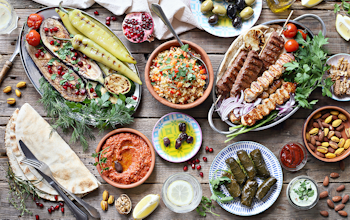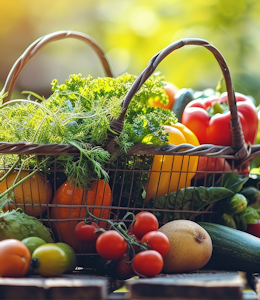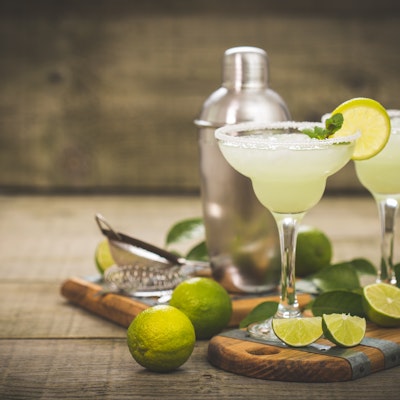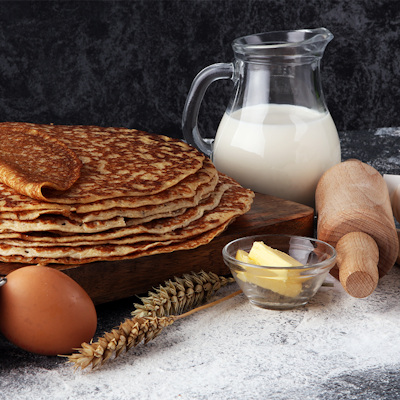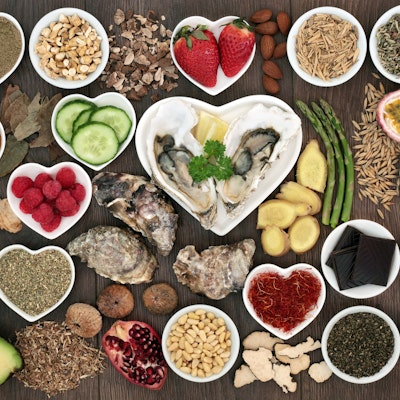Best food and drink to take to the beach

What food and drink is good to take to the beach? Well, it should be easy to eat without utensils and equally easy to tidy up after. It should be refreshing and hydrating, and crucially - able to be consumed at room temperature, or able to stay chilled without electric refrigeration. We’ve put together a fantastic list that fits the bill.
Here’s the list of the best food and drink to take to the beach:
- Spinach and cheddar muffins
- Hummus and crudites
- Sangria
- Frozen grapes
- Hard boiled eggs
- Watermelon
- Pickles
- Salami sandwiches
- Homemade lemonade
Now let’s find out more about them..
Spinach and cheddar muffins
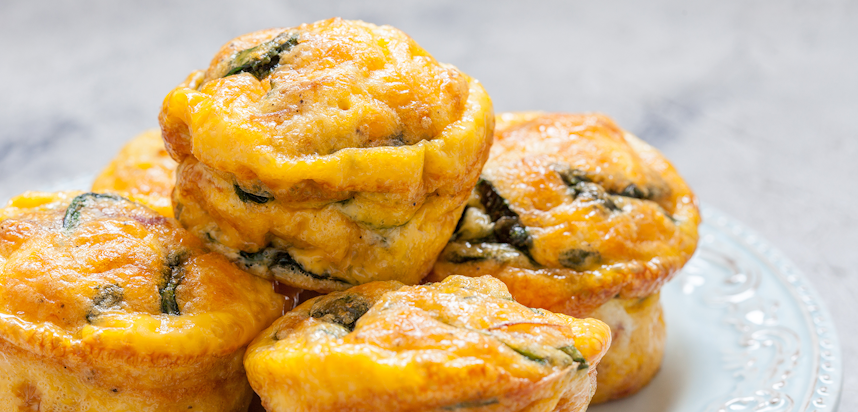
Why spinach and cheddar muffins are good for the beach
As individual tasty treats, spinach and cheddar muffins are a great snack that don’t require utensils. Plus, if they’ve been pre-removed from their wrapper, they don’t even require any disposal (well, except for a few crumbs that might fall onto the sand and can be quickly covered over to avoid attracting insects).
They’re also an option that’s both light, and filling - with ingredients like spinach and spring onion providing a fresh, healthy contrast to the indulgent cheese and muffin batter.
How to store and transport
Once fully cooled, store your muffins in an airtight container lined with greaseproof paper. This will prevent the muffins drying out, and keep them moist until you’re ready to eat them at the beach.
Top tip
Replace the milk in your recipe with buttermilk - it will the muffins even more moist, a big plus in hot weather!
Allergen alert!
Muffins are made with wheat flour - a Cereal containing Gluten, Eggs and some sort of Milk product - either milk itself, butter, yoghurt or buttermilk. All of these are among the 14 major food allergens.
Hummus and crudites
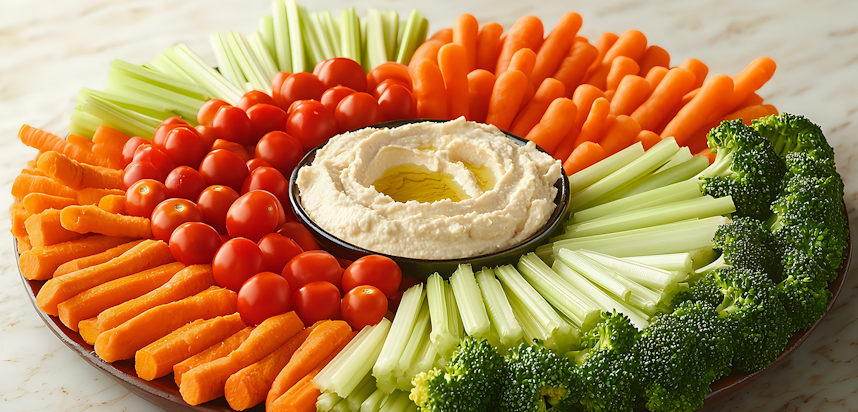
Why Hummus and crudites are good for the beach
Hummus and crudites are the perfect balance of light and rich, and work as both a snack or part of a larger picnic platter, and can be shared or divided into individual portions. Cool, creamy hummus and fresh, crunchy crudites are also refreshing on a hot day.
Eating and drinking at the beach - Avoid tea and coffee
Not just because they’re usually served hot! Tea and coffee are both diuretics, which means they will make you feel dehydrated (and also make you want to use the toilet more, which isn’t ideal at the beach).
How to store and transport hummus and crudites
Keep your crudites fresh in a ziplock or click and seal freezer bag, and the hummus tightly sealed in a mason jar or airtight container. Ideally, everything should be transported in a cooler or cool bag and kept there until right before consuming.
Top tip
Add an ice cube to your hummus when blending the ingredients together to make it - particularly when using canned chickpeas. Not only will it give the hummus a creamier texture, but if you’re pushed for time it will help it cool down quicker.
Allergen alert!
One of the main ingredients in hummus is tahini, a paste made with Sesame. Sesame is one of the 14 major food allergens.
Sangria
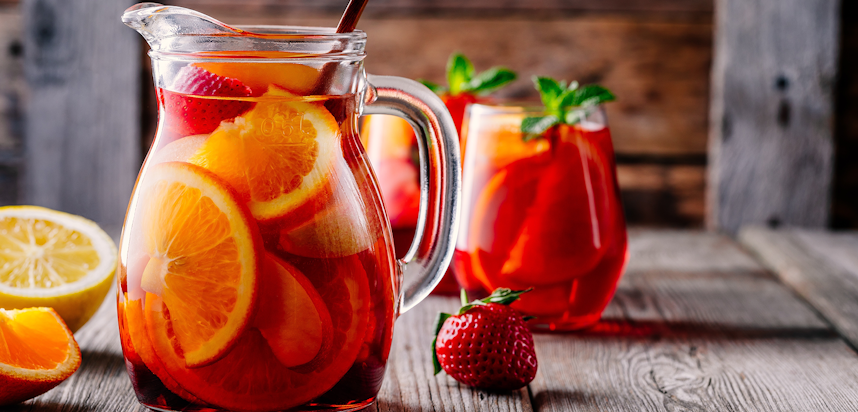
Why Sangria is good for the beach
Sangria originates from the Spain Portugal region of Europe, and they know a thing or two about what to drink when it’s hot outside!
Made from red wine, brandy and chopped fruit as well as other optional ingredients like sugar, sangria can be served as a long drink, heavy on the ice - making it more refreshing than other alcoholic beverages in a hot beach environment and less likely to leave you dehydrated.
How to store and transport Sangria
If making a large amount of sangria it might be worth investing in a sangria dispenser, but otherwise sealed jugs in a fridge and then a cooler can work, or even a thermos if you’re only taking a couple of servings.
Top tip
Add fresh vanilla seeds to your sangria to enhance the flavours in it.
Allergen alert!
The red wine in sangria may contain some Sulphur Dioxide.
Frozen grapes
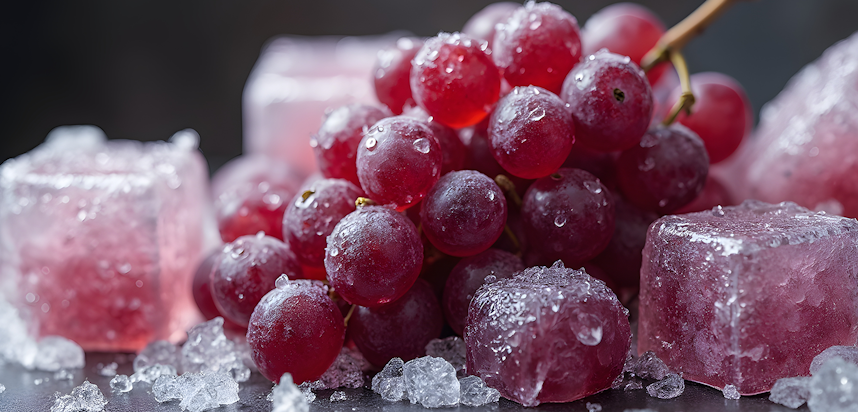
Why Frozen grapes are good for the beach
Frozen grapes are the ideal beach snack - healthy, juicy and rehydrating. Relatively low-calorie, they’re also bursting with antioxidants and with their high-water content they’ll help replace all the electrolytes and moisture you’re sweating out.
Eating and drinking at the beach - Pre-freeze bottles of water
Freeze bottles of water overnight and take them to the beach while they’re still frozen solid. Throughout the day they will melt, providing a constant source of chilled water (no one wants to drink it warm!).
How to store and transport Frozen grapes
Frozen grapes should be stored in a a tupperware in a small cool bag, though you can take them out a little while before eating so they begin to melt and taste extra juicy if you like.
Top tip
For lightly frozen grapes, keep them in the freezer for at least 2 hours. If you prefer something firmer more akin to ice you’ll need to keep them in there for at least 8 hours.
Allergy alert
Grapes are not a major food allergen.
Hard boiled eggs
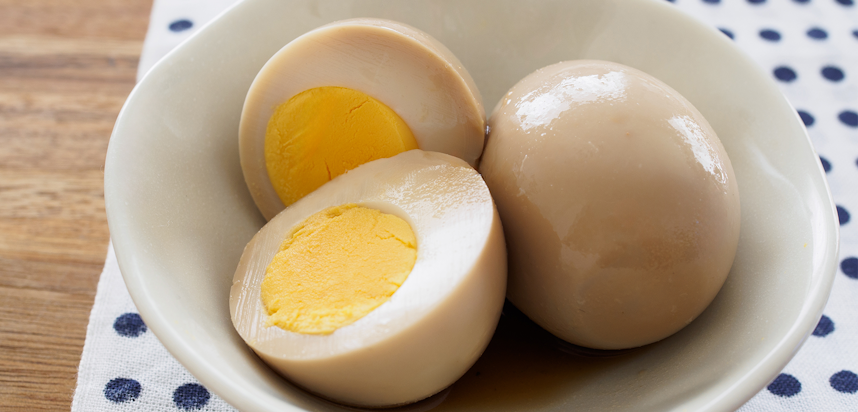
Why Hard boiled eggs are good for the beach
As well as possessing a sense of nostalgia, hard boiled eggs are actually a great beach option as they are relatively low-mess to eat (and have a naturally biodegradable wrapper in a shell!), do not require utensils, and pair well with other popular beach foods like sandwiches and crisps.
How to store and transport Hard boiled eggs
The eggs should be completely dry (test this with kitchen roll) before being stored in an airtight container. The container should also have hard edges in order to reduce the risk of the eggshells breaking during transportation.
Top tip
As soon as your eggs have completed their cooking time (which depends on just how hard you want them), immediately transfer them to an ice water bath. This will separate the egg membrane and shell, giving you eggs that peel perfectly.
Allergen alert!
Eggs are one of the 14 major food allergens.
Eating and drinking at the beach - Bring your own shade
A large beach umbrella is a must if you’re eating, as you’ll want all your food to be kept in the shade, even if it’s already in a cool bag or tote. Direct sunlight is a great friend to food poisoning.
Watermelon
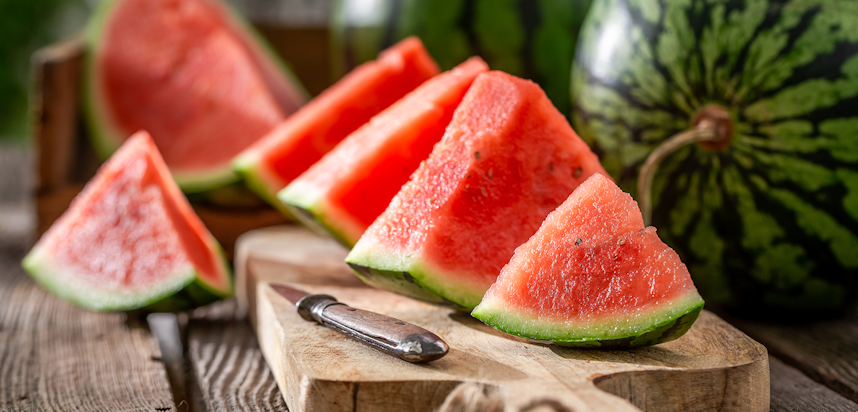
Why watermelon is good for the beach
Watermelon is perfect for group gatherings on the beach, as it's a large fruit that provides many portions. It's also juicy, refreshing, and because watermelon has such a high water content it’ll actually keep you more hydrated in hot weather.
How to store or transport watermelon
If you’re taking a whole watermelon and plan on cutting it up at the beach, you can keep it at room temperature in a dry place until you want to prep it - just make sure it’s not in direct sunlight. If you’re taking cut pieces with you, try wrapping them individually in clingfilm and then placing in a cool bag.
Top tip
Squeeze fresh lime juice over your slices of watermelon. This will plump up the flesh and give it an extra zingy, fruity flavour.
Allergen alert!
Watermelon is not among the 14 major food allergens.
Pickles
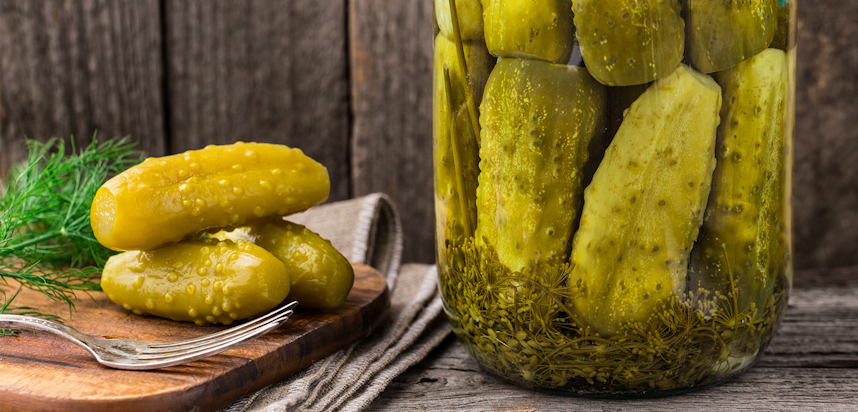
Why pickles are good for the beach
Pickles are a great beach food because not only are they convenient and easy to snack on, they have a high acidity that cuts through any rich food you’re having - like cheeses, ice cream and sandwiches, reducing that bloated feeling you want to avoid in hot weather.
How to store and transport pickles
Try and opt for shelf stable pickles rather than the refrigerated kind, as these can just be stored in a dark, dry place like a tote bag until you want to consume them. Avoid putting the pickle jar in direct sunlight.
Top tip
Pickles make a great snack food, but you can also use pickles to add pizazz to other foods you’re taking to the beach - add a kick to salads or a crunch to sandwiches.
You can even use the pickle juice to make cocktails with spirits like vodka or tequila.
You may also be interested in…
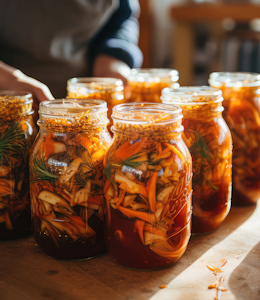
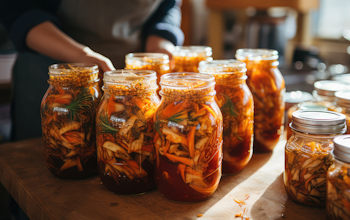
You may also be interested in…
The 4 Ks - food and drink for gut health
ReadAllergy alert!
Pickled foods contain Sulphur Dioxide, which is one of the 14 major food allergens.
Salami sandwiches
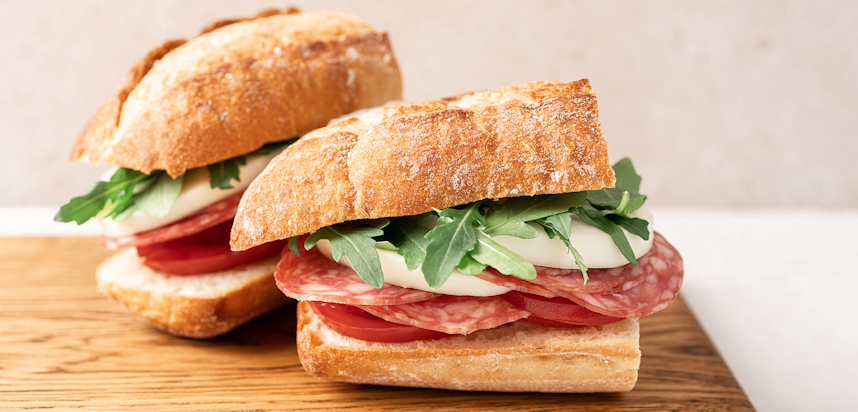
Why salami sandwiches are good for the beach
Sandwiches are great to eat at the beach because you can eat them with your hands, and depending on the filling, don’t have to be messy.
Eating and drinking at the beach - Be barbecue safe
If you’re barbecuing on the beach make sure you pour cold water directly onto the sand where it’s been sat when you remove it. This is to prevent people and animals burning themselves if they walk over it after you’ve gone.
How to store and transport salami sandwiches
Wrap the sandwiches in greaseproof, or parchment paper - like foil or clingfilm this will prevent the sandwich from drying out, but unlike foil and clingfilm greaseproof paper is porous and itself absorbs excess moisture.
This will stop the sandwich from going soggy.
Top tip
Add a layer of spicy mustard to your sandwich - the flavour cuts through the fattiness of the meat for a delicious contrast, and mustard can also withstand warmer weather.
Allergen alert!
Most sandwiches are made with a wheat or rye-based bread, both of which are Cereals containing Gluten. In the UK, many sandwiches are also made with butter - a derivative of Milk, or even mayonnaise - made with Eggs. These are all major allergens, and Mustard, if included in the sandwich, is also a major food allergen.
Homemade lemonade
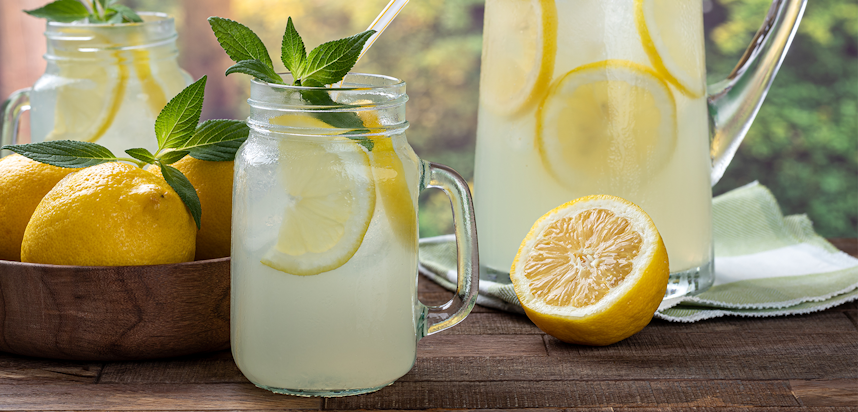
Why homemade lemonade is good for the beach
Citrus flavours are undeniably summery, but more than that, they are full of antioxidants and in the case of lemon, potassium, which aids hydration in the body. Homemade lemonade, because of its strong ingredients like lemons and sugar, can also withstand being diluted without totally losing flavour - important when you’re going be wanting to add lots of ice to cool down.
How to store and transport homemade lemonade
Store the lemonade in an airtight jug in a cool bag, and only add ice or sparkling water to individual glasses or cups when the beverage is served.
Top tip
If you’re finding your homemade lemonade tastes bitter, add a pinch of salt. This should balance the flavour out.
Allergen alert!
None of the main ingredients in lemonade are major food allergens, but citrus fruits, of which lemons are one, are on the list of allergies on the rise. You can find out more about allergies on the rise here.
You may also be interested in…


You may also be interested in…





